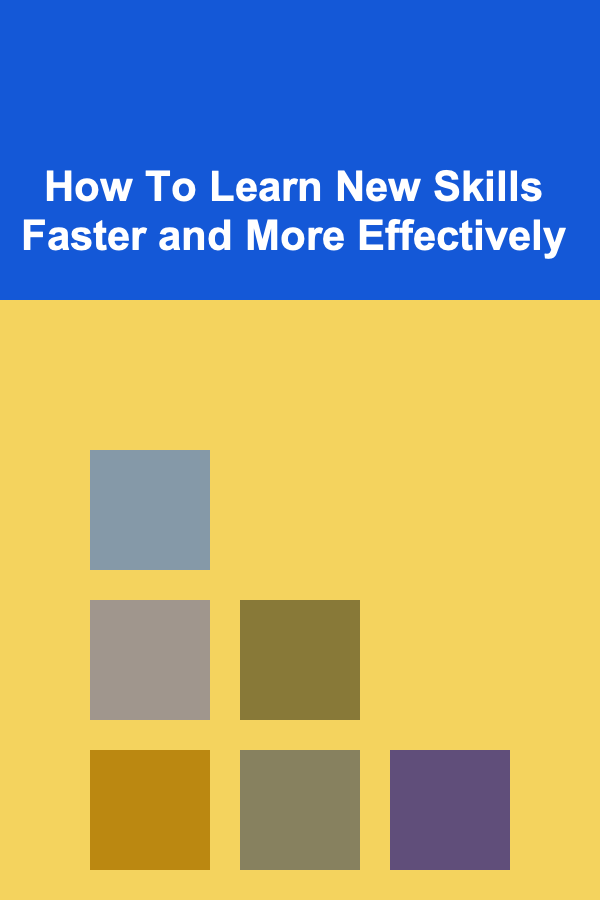
How To Learn New Skills Faster and More Effectively
ebook include PDF & Audio bundle (Micro Guide)
$12.99$8.99
Limited Time Offer! Order within the next:

Learning new skills is a valuable part of personal and professional growth. Whether you're trying to pick up a new language, become proficient in a musical instrument, or acquire technical skills for your job, the ability to learn efficiently can significantly impact your success. However, many people struggle with the learning process, often feeling overwhelmed by the amount of information or the time it takes to master a new skill. The good news is that there are scientifically backed strategies that can help you learn faster and more effectively. In this article, we will explore these strategies, break them down step by step, and offer practical advice for applying them in your own learning journey.
Understanding How We Learn
Before we dive into strategies for faster learning, it's important to understand how learning works on a neurological level. Learning is a complex process that involves the brain's ability to form new connections, strengthen existing pathways, and adapt to new information. The process of learning begins with attention , as you focus on new information. This is followed by encoding , where the information is stored in your brain for later retrieval, and retrieval, where you access and apply the knowledge.
The more effectively we can engage these stages, the faster and more efficiently we can learn. Here are some foundational concepts that are critical to understanding how to learn new skills effectively:
Neuroplasticity: The Brain's Ability to Adapt
One of the most exciting discoveries in neuroscience is neuroplasticity, which refers to the brain's ability to reorganize itself by forming new neural connections. This means that with the right approach, the brain is capable of learning and adapting throughout your life, no matter your age. By harnessing this ability, we can improve the efficiency and speed of learning.
The Role of Memory
Memory plays a central role in learning. There are different types of memory, including working memory (the short-term storage of information) and long-term memory (the storage of information over time). The more you can engage long-term memory and minimize reliance on working memory, the faster and more effectively you can learn new skills.
Strategies for Faster and More Effective Learning
Now that we understand some of the underlying principles of learning, let's explore some practical strategies to help you learn new skills more effectively.
1. Set Clear, Specific Goals
One of the first steps in learning anything is to set clear and specific goals. Vague goals like "learn to play the piano" or "get better at coding" are not actionable and may lead to confusion or frustration. Instead, break down your overall goal into smaller, measurable, and time-bound objectives. For example:
- "Learn to play three songs on the piano in three months"
- "Complete a coding project by the end of the month"
By setting specific goals, you create a roadmap for your learning process. This not only makes the process more manageable but also helps to maintain motivation, as you can track your progress and celebrate small wins along the way.
2. Embrace Deliberate Practice
Deliberate practice is a concept popularized by psychologist Anders Ericsson, who studied the habits of expert performers. Unlike regular practice, which is simply repeating tasks, deliberate practice is focused, structured, and designed to improve performance. It involves pushing your limits by practicing tasks that are just beyond your current abilities and receiving feedback on your performance.
Key elements of deliberate practice include:
- Focus: Practice in short, focused bursts. Rather than spending hours mindlessly practicing, engage in high-quality, focused sessions that target areas where you need the most improvement.
- Feedback: Get regular feedback on your performance to understand what you're doing right and what needs improvement. This feedback is crucial for making adjustments to your practice and refining your skills.
- Challenge: Continuously push yourself to do slightly more difficult tasks. Over time, this will help you develop higher-level skills.
3. Use Spaced Repetition
Spaced repetition is a learning technique that involves reviewing material at increasing intervals over time. This technique takes advantage of the spacing effect, a phenomenon where information is better retained when it is studied over a longer period, with breaks in between. Instead of cramming information all at once, spaced repetition helps move knowledge from short-term memory to long-term memory, making it easier to recall later.
There are several tools and apps available, such as Anki or Quizlet, which are based on spaced repetition algorithms and can help you memorize new information more effectively. Using these tools can be especially helpful when learning a new language, studying for exams, or acquiring technical knowledge.
4. Focus on Understanding, Not Just Memorization
While memorization plays a role in learning, understanding the underlying principles and concepts is far more important for long-term success. When you focus on deep learning---understanding the "why" behind a skill---you are more likely to retain and apply the knowledge in different contexts.
To foster deep learning, try the following:
- Teach others: Explaining a concept to someone else forces you to clarify your understanding and reinforce your knowledge.
- Use analogies: Relating new information to something you already understand can help make abstract concepts more concrete.
- Ask questions: Don't just accept information at face value. Question it, challenge it, and think critically about how it fits into the broader picture.
5. Utilize the Power of Multimodal Learning
Different people learn best in different ways. Some people are visual learners, while others are auditory or kinesthetic learners. One way to accelerate the learning process is by using multimodal learning, which involves engaging multiple senses and learning methods simultaneously. For example:
- Visual: Watching videos, diagrams, or flowcharts to grasp concepts.
- Auditory: Listening to podcasts, lectures, or audiobooks to hear explanations.
- Kinesthetic: Engaging in hands-on practice or simulations to apply concepts.
By combining different learning modalities, you can reinforce your understanding and make the learning process more engaging and effective.
6. Create a Consistent Learning Routine
Consistency is key when it comes to learning new skills. Establishing a routine helps create momentum, making it easier to continue learning over time. The brain thrives on regularity, and forming a habit of learning regularly can help you make steady progress.
Here's how to build a consistent learning routine:
- Set aside dedicated time: Treat learning like any other important task in your schedule. Set aside time each day or week specifically for learning your new skill.
- Start small: If you're trying to form a new habit, begin with small time blocks---such as 20-30 minutes a day---and gradually increase the duration as you become more comfortable.
- Stay accountable: Track your progress, set reminders, or partner with a friend to stay accountable to your routine.
7. Stay Motivated and Manage Your Emotions
Learning a new skill can be challenging, and it's normal to face setbacks and obstacles along the way. However, maintaining motivation is crucial for staying on track. Here are a few ways to stay motivated during your learning process:
- Focus on the process, not just the outcome: While it's great to have goals, the learning process itself should be enjoyable. Find ways to make the journey itself rewarding.
- Break tasks into manageable chunks: If a task feels overwhelming, break it down into smaller steps. This makes it more approachable and less intimidating.
- Celebrate small wins: Recognize and reward yourself for small achievements along the way. This will keep your spirits high and reinforce positive behavior.
- Develop resilience: Understand that failure is part of the learning process. When you encounter difficulties, view them as opportunities to learn and grow rather than setbacks.
8. Sleep and Rest for Optimal Learning
Never underestimate the importance of rest and sleep when learning new skills. Sleep plays a vital role in consolidating memory and improving cognitive function. Studies have shown that sleep after learning helps to strengthen new neural connections, making it easier to retain information and recall it when needed.
Aim for 7-9 hours of quality sleep per night, and don't neglect the importance of short breaks during learning sessions. Taking breaks helps refresh your brain and prevents burnout, allowing you to learn more effectively.
Conclusion
Learning new skills quickly and effectively is within your reach. By understanding how the brain learns and applying scientifically backed techniques like deliberate practice, spaced repetition, and multimodal learning, you can accelerate your progress and make the most of your time and effort. Remember, it's not just about the destination but the process itself. Approach learning with curiosity, consistency, and patience, and you'll find that acquiring new skills becomes not only faster but more enjoyable and rewarding.

How to Celebrate Your First Christmas in a New Home
Read More
How to Create a Checklist for Social Connection and Relationships
Read More
How to Maximize Space in a Small Apartment
Read More
Top Tips for Saving Money on Car Rental Services
Read More
Exploring Quantum Cryptography and Security
Read More
How to Write a Compelling Grant Proposal for Social Services
Read MoreOther Products

How to Celebrate Your First Christmas in a New Home
Read More
How to Create a Checklist for Social Connection and Relationships
Read More
How to Maximize Space in a Small Apartment
Read More
Top Tips for Saving Money on Car Rental Services
Read More
Exploring Quantum Cryptography and Security
Read More